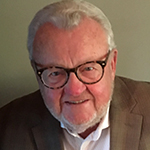In This Section

Stephen L. Bakke
2019 Inductee, Manchester Commercial Finance
Steve’s undergraduate education began at Luther College in Decorah, Iowa from which he graduated in 1968 with majors in accounting and economics. That was a busy year. He passed the CPA exam, married Lois (now married 51 years), started his first job in a major CPA firm, and soon thereafter was drafted into the U.S. Army. Most of his Army career was spent at West Point Military Academy in administration at the Army hospital.
After the Army Steve received an MBA degree from the University of Minnesota in1971. Then came employment with the Deloitte CPA firm in New York City and Minneapolis. From there he entered the asset-based lending industry by joining Republic Acceptance Corporation in 1984. He was there until co-founding Manchester Commercial Finance in 1996. Steve became active in Secured Finance Network (formerly CFA), eventually serving as president and chairman.
Steve and Lois enjoy a wonderful family: two sons and daughters-in-law, and five grandchildren. They split time between Minnesota and Florida. Steve has more than he can handle managing his golf game, his public policy blog and website, and as a regular guest/op-ed columnist for several newspapers.
How did you get your start in the industry?
I often think about how lucky I was to find myself in this profession. And that’s what happened – one day I found myself in working for a receivables finance company. I didn’t target this industry. In fact, I had heard very little about it prior to my first job interview. After several years in public accounting, and then in my “early thirties,” I decided to change directions. Fortunately, my boss had a friend who was anxious to fill an opening with some “new blood” and he insisted I talk to Don Moberg, president of Republic Acceptance Corporation. About all I knew was that Republic made loans on accounts receivable, because one of my audit clients had been financed by Republic. I went to the job interview, listened, and was immediately enthusiastic about starting work as soon as possible. And now here I am, age 72, and wondering where all the time went.
The travel down this path covering several decades has been fun. I’ve been with “acquired” companies several times, finally with a receivables financing company that I had co-founded, Manchester Commercial Finance. I retired soon after that acquisition. SFNet, formerly CFA, was part of my professional activities for most of my career. And it all started when my new boss at Republic decided he wanted me to get involved at the national level, and actively represent Republic.
What are some of the most memorable moments of your career?
My involvement with SFNet provided me knowledge and leadership opportunities I couldn’t have found elsewhere. Two things stick out as my most gratifying association “jobs” prior to my time as an SFNet officer. First, I was asked to take over chairmanship of what we then called the “Small and Independent Finance Company Committee.” This was no committee per se, but rather a group of wonderful entrepreneurial finance companies that was looking for some direction. While I was the Chair, we created true agendas for discussion and relevant educational opportunities for its members. Soon after that experience, the association was going through the painful process of trying to produce our first strategic plan. With the help of many people on the staff and from SFNet membership, I completed the process of pulling a lot of information together, and writing the plan. Then came the great experience serving on the Management Committee and finally serving as president and chairman. And, I will never forget that as president, I had the difficult honor of welcoming attendees to the convention in San Francisco, very soon after 9/11.
What advice would you offer to someone just starting out in the industry?
Because of the experiences I’ve had during my active involvement in SFNet, I’m compelled to encourage new industry employees to make sure involvement with SFNet is one of their professional goals. Of course, employers must be willing to back them in that effort. Future SFNet leaders will come from those active in the association at the national level and many also have been active at the Chapter level. I encourage all newcomers to set that as a goal, and don’t forget that all roads to that goal pass through the annual convention. Paraphrasing past Executive Director Len Machlis in his first address to members, way back in the ‘60s: “This convention is our association on parade – its services and members come together to strengthen and create.” Our young employees should set some goals for industry involvement and definitely check out the annual convention.
Professional Development Courses
- Live online classes for ABL and Factoring professionals
- On Demand classes in Appraisals, Factoring, Legal, Workout & Bankruptcy

